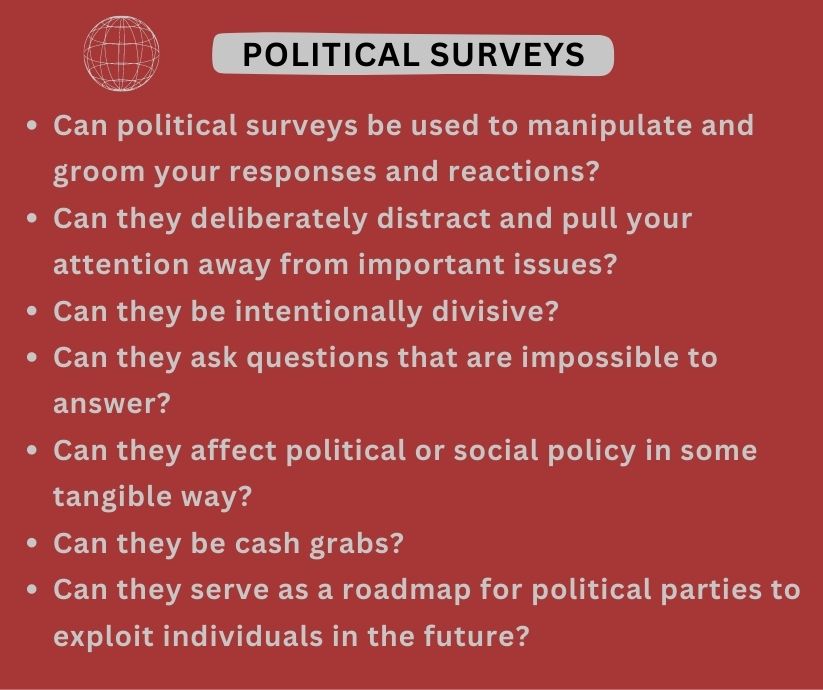
I have been a paid member of Canada’s 3 main political parties this past year because I want to know how and what they communicate to their members. All three parties send out regular political surveys and all three ask for donations in their survey emails. We tend to believe that surveys have a purpose, are objective tools to gauge public opinion and are essential for creating public policy. Are they?
A recent survey got me thinking about what political surveys can be used for aside from helping to make policy decisions.

To me, a helpful survey is one that asks a clear question about a well-understood issue and explains the options. So for example a town-level survey about garbage pickup might be worded as follows: “We currently pick up garbage once a week. Some citizens have requested garbage pickup twice a week. This would incur extra costs. Would you be in favour of twice-a-week garbage pickup if it increased your municipal taxes by $150 a year (our estimate of additional cost)? ( ) Yes ( ) N
This is a recent survey I got. I have removed party identifiers and replaced identifier words with xxxx.
POLITICAL SURVEY QUESTIONS – How important is:
- 1. Keeping hard drugs off our streets and ending the handouts of tax-funded drugs to addicts
- 2. Cracking down on foreign interference
- 3. Stopping big city gatekeepers and building more homes fast to stop skyrocketing housing costs
- 4. Reforming the bail system to keep violent, repeat offenders off our streets
- 5. Repealing xxxx Bill C-11
- 6. Curbing runaway inflation by capping government spending
- 7. Undoing the xxxx passport redesign that erases Canadian history
- 8. Ending the attack on law-abiding firearms owners
- 9. Fixing the xxxx air travel mess and bringing home affordable, reliable flights
- 10. xxxx [remove] carbon taxes
- 11. Supporting our industries to deliver powerful paycheques for Canadians
- 12. Defunding the CBC
- 13. Respecting our veterans and soldiers
The survey email included this message: ” With the damage the xxxx radical [political party] continues to inflict upon our country, it is critical that we bring our message of hope and freedom to Canadians from coast-to-coast and present a path to a better future.”
The inflammatory tone is deliberate to get you to fill in the survey. ‘By God! I’ll answer that survey and give them a piece of my mind.’ And when you’ve finished giving your opinions you might be invested enough to also give them a few dollars to “fix things” on your behalf. The comment “it is critical” might also tell you how you should think or what you should focus on.
The value of this particular survey is questionable. How many of the questions are spelled out clearly enough for you to understand the issue? #3: “Stopping big city gatekeepers…” I would love to stop big city gatekeepers but who are they? Are they wealthy investors who are speculating on limited housing and driving up prices? Are they provincial or city governments that have not invested enough in adequate rental properties – especially for lower-income earners? Or what about underfunded rental boards that are not controlling runaway rents? And how does this party propose to stop them? Your guess is as good as mine.
Many surveys contain distracting questions meant to create issues where there are none. Like, #7: how important is the artwork on the new passport to your life or your Canadianship? On mine, it comes in at a close second to sorting out my sock drawer. Does it deserve to be on a federal party’s survey? Do you need to be thinking about it?
What about implied promises that mean nothing? #11: “Supporting our industries to deliver powerful paychecks for Canadians”. Supporting which industries? Does that support include subsidizing wealthy companies in the hopes that they will create more jobs or pay their employees more? Trickle-down economics has been done to death and doesn’t work. And what is a powerful paycheque? Apart from the alliterative P sound of Powerful Paycheques, it is meaningless.
“Cracking down on foreign interference” makes us think of China or Russia and of course, they should not be interfering with Canadian politics. But what about American-owned and controlled media like Postmedia which represents approximately “130 brands across multiple print, online, and mobile platforms”? Postmedia is currently 66% owned by American media conglomerate Chatham Asset Management. Does this qualify as foreign interference? Does the question mean we should consider removing or discouraging foreign ownership of Canadian media?
Most of the questions on this survey are unclear or insignificant.
What about surveys that ask questions that are too big? Or ask you to rate huge issues in order of importance? For example, a common one is “How important is fixing global warming to you?” If my opinion is that global warming is not important does that mean that any provincial or federal government should be ignoring it? How am I supposed to rate huge issues stacked against each other when they are all important?
Are all opinions equal? I don’t think so. If you have no idea about a particular subject how is your opinion in any way valid? In this respect, I do like surveys that include an “I don’t know” option.
The use of surveys to inject political poison (jabs at politicians and other parties) worries me. The survey above includes many jabs at another party. The wording seems to indicate that this party or politician is a “gatekeeper” or is “handing out tax-funded drugs to addicts” for example. Is this true? The not-so-subtle message is you should dislike that party or politician. There is no impartiality in this survey.
We are endlessly manipulated by the media, social media, influencers, and politicians. Each one vies for our attention. Each one has an agenda. And that agenda includes distracting the populace. Manufactured or hyped-up issues are a great way to keep us occupied. Political and corporate corruption thrives when our attention is elsewhere.
By understanding this manipulation, we are less vulnerable to being misled or distracted. We can stay focused on the core matters that genuinely impact our lives and the lives of our families.
We are better served by paying attention to big issues like global warming, pollution, immigration etc and more individual ones like salaries, public services like healthcare and schooling, equitable taxation and how it is spent, laws and policies etc. It is essential to respond to real issues through our votes and by voicing our opinions to our elected leaders. This enables us to stay engaged and actively participate in shaping our future.
Photo by Sivani Bandaru on Unsplash











